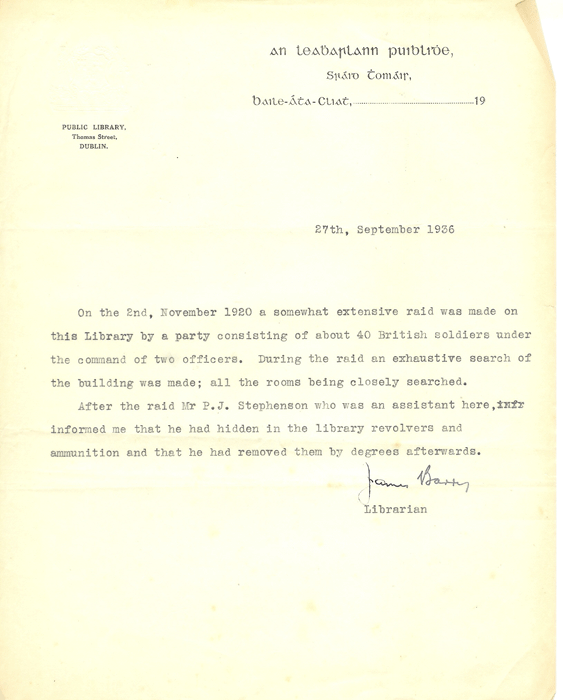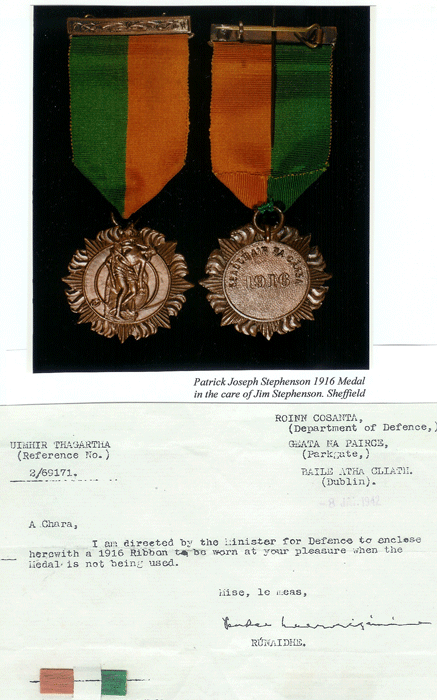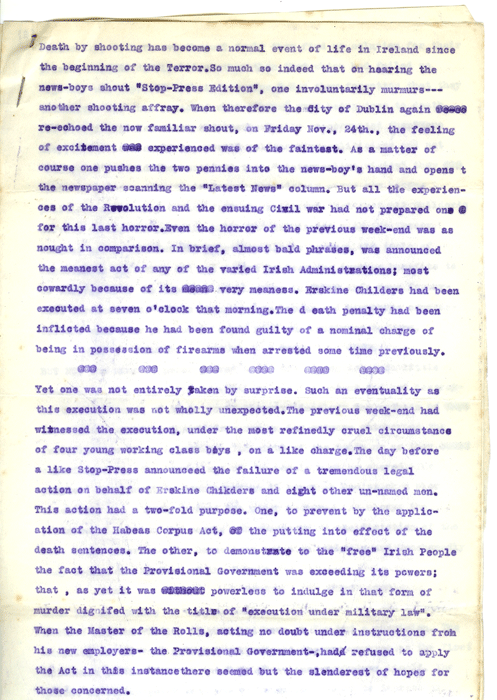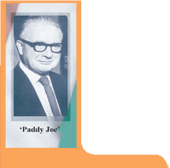‘Paddy Joe’ (1895-1960): a tribute to a 1916 fighter
It is clearly seen from Heuston’s Fort, that Paddy Joe played a full part in the Easter Rising, serving not only in the Mendicity, but also in the Four Courts, the Independent Offices, and the G.P.O. However, there is unfortunately very little detailed information about his time in those other Garrisons.
At the end of the week, he was amongst those Irish forces from the G.P.O. garrison who surrendered to the British in Moore Street. From there he was taken to Richmond (now Keogh) barracks. He was, however, not court-martialled, but was one of those interned without any trial, hearing, or sentence.
During the same 24 hour period when his Father was being buried, Paddy Joe was taken from Richmond Barracks to Knutsford Jail in England, and after a matter of weeks was taken to Frangoch prison camp in Wales, until his release back to Dublin in September 1916, 5 months later.
Paddy Joe returned to his comrades in the 1st Battalion, D Company, and early in 1917 was promoted to Adjutant. In July of the same year he was elected by the Fianna at their Ard Feis to Adjutant General, under the new Chief of Staff Commandant Eamon Martin. Paddy Joe continued to play an active part in the fight for Irish freedom until late 1921.
He took part in armed raids on pawn shops to take arms, which had previously been pawned by Irish born members of the British Army, who had deserted in large numbers from the slaughter of the battlefields of WWl, and also subsequent to the executions of the 1916 leaders. He led an armed raid on the Pawn Offices on Ellis’ Quay on 25th April 1918 where cash and rifles were taken; shots were fired but there were no casualties. It is highly likely that he was involved in obtaining funds and weapons, by way of other armed raids, on other institutions such as banks, and post offices.
Whilst Paddy Joe served as the Adjutant General Fianna Eireann, he also worked to support his family (he became a Father on 19th July 1918), as an Assistant Librarian in Thomas Street Library; this was the career path he would follow for the rest of his life - literally until the day he died. He had secured the job as Assistant Librarian when he came 2nd in a nationwide examination. He kept his job despite the almost 6 month absence in prison due to a very sympathetic, and republican City Librarian.
The quiet, studious, Asst. Librarian was a good cover for a rebel, and he used that to good effect. The Library was a place where he often hid guns and ammunition. During this time he married Mary Kilmartin on 17th September 1917, and continued to hide rifles in the newlyweds' home in 26 Stoneybatter, and also in Kane’s shop, which was previously the home to his new wife, and the business of his brother-in-law and fellow Volunteer and Freedom fighter Paddy Kilmartin. He also stashed arms in his Mother’s house most likely without her knowledge!
Both Paddy Joe and Paddy Kilmartin, assisted in the escape of republican prisoners, smuggling messages into the gaol, with instructions for the escape, and then acting as escorts to safe houses for the escapees. Along with Sean Brunswick, their brother in law, they often acted as armed body guards to senior IRB officers at various meetings, and events. Sean Brunswick was acting in such a capacity when Sean Treacy was killed.
Paddy Joe was Director of Transport, North side, during the General Election of 1918 for Sinn Fein, making himself an assassination target.
He was placed in Charge of the Skippers Alley Commando, to organise a young Fianna group to carry out the Anti Conscription fight in 1918. He directed operational training for this in the Dublin Mountains using his own fighting experience but mostly the knowledge he had gleaned from the “Frongoch University for Guerrilla Fighters”
On 1st April 1919 he was responsible for receiving, and transferring arms taken in a significant raid on Martello Barracks
His Home was raided a number of times in 1918 /1919 by British Auxiliaries, and then Black and Tans because of his previous activities with Fianna Eireann. The Library where he worked in Thomas Street was also raided by the British (40 Soldiers) at a time when he had a large stash of revolvers on the premises, which luckily were not found, as summary execution on the spot was often the British Army’s way of dealing with such matters. (See letter from J. Barry)
As Adjutant General for Dublin Brigade he had cause to deal with senior IRB such as Michael Collins, who was Adjutant General for All Ireland in 1918, and it was to Collins that he had to defend his long standing friend - his Best man at his wedding Godfather to his son Patrick, and fellow Volunteer - Sean McLaughlin. This was with reference to rumours of misuse of Volunteer funds, by MacLaughlin (See Letter from Michael Collins)
Paddy Joe joined the Freedom movement in 1910 as a young Fianna scout and Gaelic Leaguer. He served his Country as a Volunteer in 1916, retiring in 1921, when he was Adjutant General of Fianna Eireann, Dublin Brigade.
Paddy Joe received both the 1916 Medal, and the War of Independence Medal, (‘Black and Tan’) medal, both of which remain in the care of the family. These service medals are supported by the certificate of service issued by Department of Defence in 1936. The Certificate of Service entitled Paddy Joe to a Military Service Pension, and he received a Soldier's Pension of £46-17s-6d per annum, rising to £76-15s-0d the year that he died.
He was also invited to sign Ireland’s Roll of Honour and his signature can be found under the ‘GPO Garrison.’
Paddy Joe chose not to fight against his fellow Irishmen in the Civil War: he did not care to take up arms against friends and people who had fought with him in the past, or against Leaders he admired and respected. Instead he focused on the formation of a radical socialist party, The Irish Communist Party. His part in that initiative was short lived: although he was a founding member of the Party with Roddy Connolly he was also a young man in his twenties with a growing family. He had to forsake the party to focus his energies on his family and career after an ultimatum from his wife Mary who was a devout Catholic: as the Irish clergy had denounced the Party she wanted her husband to choose the communist Party or her! Paddy Joe left the party he helped form.
During the Civil war, although it is known that his sympathies lay with the Republican cause, he took no active part in the conflict, as the thought of fighting a fellow Irishman was alien to him, and he felt both sides could have conducted themselves in a way to prevent loss of Irish lives. It was something that made him very sad and angry as can be seen from his writing on the day Erskine Childers was executed. (death by shooting…..)





